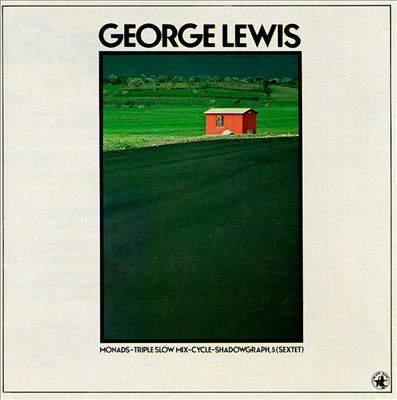4. George E. LewisShadowgraph, 5 (Sextet)

The way that George Lewis dealt with tone, these long, stretching bands of sound, is something that I really appreciate. Maybe that’s coming from the place of a trombonist. These long glissandi sounds are something that really speak to me. I think, potentially, it’s due to the fact that the voice is my main instrument. And I often will treat the voice in a similar way, drawing out these very long tones and making subtle shifts inside the tone itself by the way in which I hold my body or how the air comes out. And so I feel like that’s probably for me one thing that drew me in to that specifically, just the kinship of the breath.
I don’t think I’ve ever seen him perform live. There was a point in my early 20s, where I had the great fortune of seeing a lot of performers of that era. When I was living in Chicago, there was a jazz and improvised music series in which I got to see so many different people, and I don’t believe I ever got to see George Lewis. It was awesome. A lot of Europeans, the German and Dutch players, improvisers and composers. But then Chicago has such a deep history, and that’s where the AACM was founded. And so I had the great fortune of seeing Nicole Mitchell, David Boykin, Hamid Drake, Fred Anderson, Robert Berry, all of these artists, so many times.
You were talking about the lack of recognition for African American composers. George Lewis’s ‘Minds In Flux’ was commissioned by Ilan Volkov for the BBC Proms last year. The first AACM member to feature; a huge deal. But they had to sandwich him in between Beethoven. And some of the reviews were so ignorant, like the Guardian reviewer trying to spot “jazz” elements, as in blues or swing. Lewis can draw on jazz language when he wants, of course, but that’s not what’s going on here.
I think when you get into any sort of critical space with these sorts of things, I feel there’s a lack of true investigation into what it is they’re doing, because of the fact that it’s not considered. I find that interesting. There was one negative review I read of the Candyman score, it was actually a British journalist who was writing for a film score website. And it’s really funny to me, because he obviously did not like the score. But he also did not like anything that sounded remotely like the score. Wasn’t open to it. And that’s fine. I don’t mind when people don’t like the things that I do, because everyone comes from their own vantage point. It’s a problem for me when these things are met with indifference: “I don’t like it. And it doesn’t sound like this, so I’m not going to give it the time of day it deserves.” And this particular writer doesn’t like those sorts of things. But it was very funny because at one point he says, “Well, if you like the more atonal or avant-garde work of Bartok or Penderecki, then you might like this,” and that’s a huge compliment! I get that you are trying to drag me at this moment, but you actually complimented me hugely, because you’re putting me in that space. I laughed heartily.


